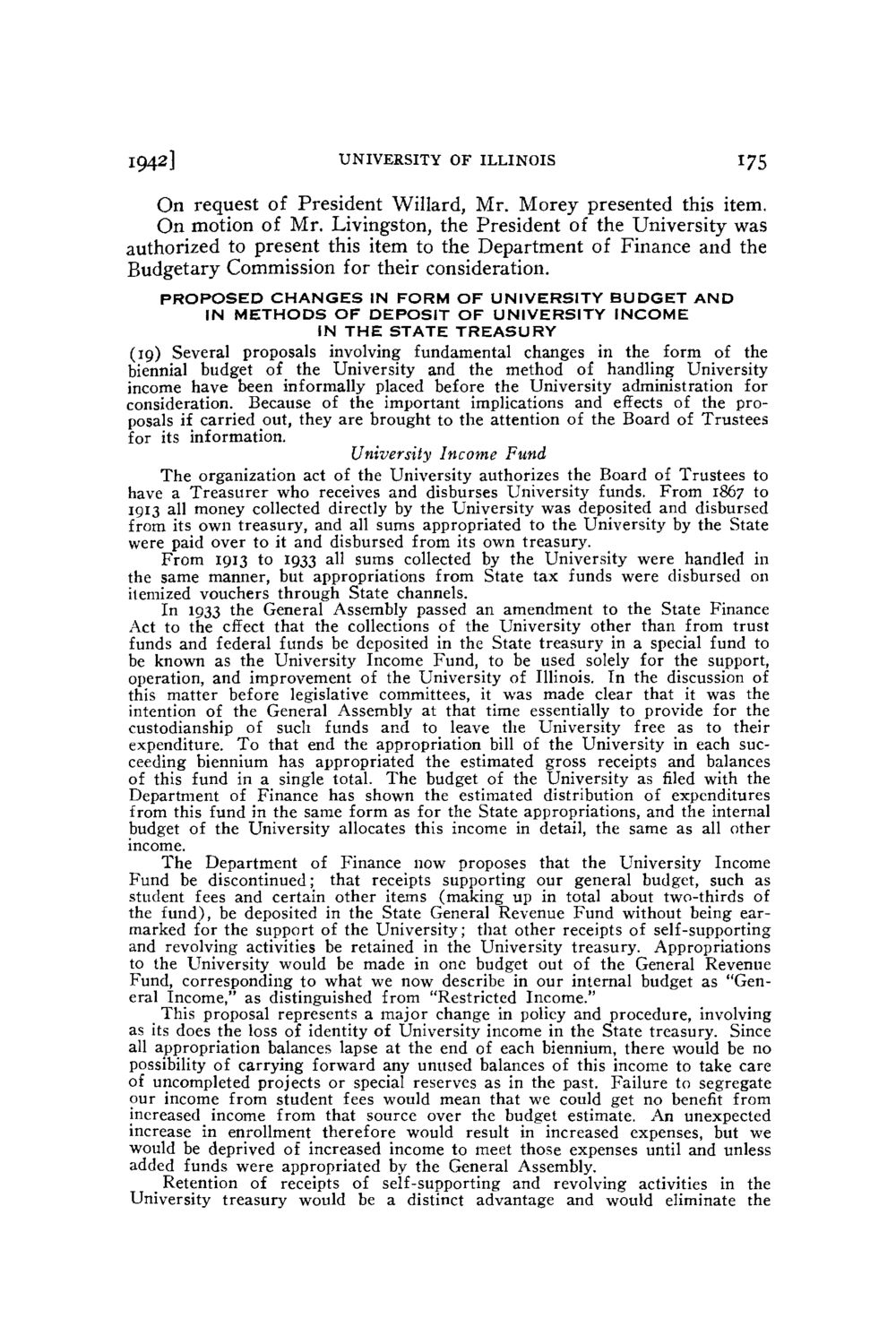| |
| |
Caption: Board of Trustees Minutes - 1944
This is a reduced-resolution page image for fast online browsing.

EXTRACTED TEXT FROM PAGE:
1942] UNIVERSITY OF ILLINOIS 175 On request of President Willard, Mr. Morey presented this item. On motion of Mr. Livingston, the President of the University was authorized to present this item to the Department of Finance and the Budgetary Commission for their consideration. PROPOSED CHANGES IN FORM OF UNIVERSITY BUDGET AND IN METHODS OF DEPOSIT OF UNIVERSITY INCOME IN THE STATE TREASURY (19) Several proposals involving fundamental changes in the form of the biennial budget of the University and the method of handling University income have been informally placed before the University administration for consideration. Because of the important implications and effects of the proposals if carried out, they are brought to the attention of the Board of Trustees for its information. University Income Fund The organization act of the University authorizes the Board of Trustees to have a T r e a s u r e r who receives and disburses University funds. From 1867 to igi3 all money collected directly by the University was deposited and disbursed from its own treasury, and all sums appropriated to the University by the State were paid over to it and disbursed from its own treasury. From 1913 to 1933 all sums collected by the University were handled in the same manner, but appropriations from State tax funds were disbursed on itemized vouchers through State channels. In 1933 the General Assembly passed an amendment to the State Finance Act to the effect that the collections of the University other than from trust funds and federal funds be deposited in the State treasury in a special fund to be known as the University Income Fund, to be used solely for the support, operation, and improvement of the University of Illinois. In the discussion of this matter before legislative committees, it was made clear that it was the intention of the General Assembly at that time essentially to provide for the custodianship of such funds and to leave the University free as to their expenditure. T o that end the appropriation bill of the University in each succeeding biennium has appropriated the estimated gross receipts and balances of this fund in a single total. The budget of the University as filed with the Department of Finance has shown the estimated distribution of expenditures from this fund in the same form as for the State appropriations, and the internal budget of the University allocates this income in detail, the same as all other income. The Department of Finance now proposes that the University Income Fund be discontinued; that receipts supporting our general budget, such as student fees and certain other items (making up in total about two-thirds of the fund), be deposited in the State General Revenue Fund without being earmarked for the support of the University; that other receipts of self-supporting and revolving activities be retained in the University treasury. Appropriations to the University would be made in one budget out of the General Revenue Fund, corresponding to what we now describe in our internal budget as "General Income," as distinguished from "Restricted Income." This proposal represents a major change in policy and procedure, involving as its does the loss of identity of University income in the State treasury. Since all appropriation balances lapse at the end of each biennium, there would be no possibility of carrying forward any unused balances of this income to take care of uncompleted projects or special reserves as in the past. Failure to segregate our income from student fees would mean that we could get no benefit from increased income from that source over the budget estimate. An unexpected increase in enrollment therefore would result in increased expenses, but we would be deprived of increased income to meet those expenses until and unless added funds were appropriated by the General Assembly. Retention of receipts of self-supporting and revolving activities in the University treasury would be a distinct advantage and would eliminate the
| |